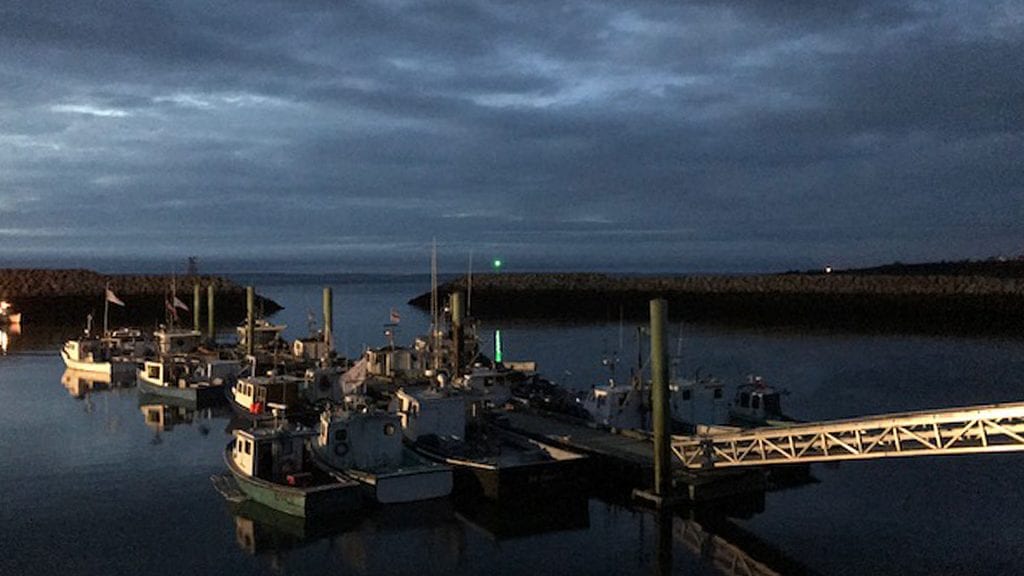
Chief Mike Sack said the emergency injunction was needed to ensure safety on the wharf and water. Photo: Angel Moore/APTN
A Mi’kmaw First Nation exercising its treaty right to catch and sell fish for a moderate livelihood has obtained a broad interim injunction prohibiting anyone from restricting Sipekne’katik band members’ access to two wharfs and a lobster pound in southwestern Nova Scotia.
Issued Wednesday afternoon, Justice James Chipman’s order also prohibits anyone from interfering with the First Nation’s lobster fishing activities, including tampering with gear, and orders them to stop intimidating and threatening those who choose to do business with the community.
The relief comes after Chief Mike Sack said the community will lose over $1.5 million due to vandalism, destruction of property and an industry boycott forcing the band to pull it’s federally-licensed vessels out of the water.
The band applied for what’s known as an ex parte injunction, meaning the hearing took place without notice or presence of commercial fishers who have protested the fishery, sometimes violently. They are named only as John and Jane Doe.
Sack told reporters the he declined an invitation to testify before the House fisheries committee Wednesday evening because of the urgency of the situation.
“Our community’s in crisis. We have lobsters we can’t move. Our band members are extremely frustrated,” he said. “It’s just not the right time for me to sit around and talk about this. We’re actually here. We’re going to make it happen on our own if that’s the case.”
Sack said he believes the band needs the injunction to ensure safety on the wharf and water.
Watch Angel Moore’s story here:
Moments before Sack spoke, the head of the RCMP said she is “fully confident” in the capability of Mounties on the ground and added that an injunction isn’t required for peace officers to maintain public safety – but police will enforce it.
“When people resort to violence and criminal activities to express their displeasure with the situation or towards a specific group, the RCMP’s increased involvement is necessary as part of the effort to maintain peace and order and to uphold the law,” Commissioner Brenda Lucki told reporters in Ottawa.
“Unfortunately, there have been those that have been engaged in criminal behaviour. As is widely known, there have been several instances of violent and destructive criminal acts in recent weeks. I strongly condemn these acts.”
The commissioner also said that some elements of enforcement fall on the Department of Fisheries and Oceans (DFO), though police will work with them.
Despite condemning the destruction, Lucki dodged questions about criticism police have been facing from several angles, including from the Minister of Indigenous Services Marc Miller who said the RCMP let the Mi’kmaq down by failing to protect them.
“Absolutely not,” she replied when asked about the minister’s comments. “I have full confidence in the highly trained officers on the ground.”
Last week an angry mob of commercial fishers surrounded Mi’kmaw fishers in a lobster storage facility, known as a pound, in Middle West Pubnico, N.S. three hours west of Halifax. Police escorted the Mi’kmaw fishers out and people then stole their catch.
Someone set a van on fire outside a separate facility earlier in the day. A man assaulted Chief Sack the following day. A few days later the West Pubnico pound subject to the attack burned to the ground in a massive blaze police deem “suspicious.”
Watch Jamie Pashagumskum’s story here:
A flotilla of fishers previously chased and blockaded the Mi’kmaw fishing vessels, fired a flare at them and seized or damaged lobster traps.
RCMP have charged two individuals accused of burning the van and assaulting the chief respectively. They say a person of interest was hospitalized with life-threatening injuries during the pound fire.
Lucki refused to acknowledge the apparent one-sided nature of the violence and attacks and also wouldn’t say if the Mi’kmaw have actually committed any crimes related to the tense standoffs and confrontations.
She came under scrutiny recently for initially refusing to admit systemic racism exists in the federal police following widespread demonstrations against police brutality. She later changed positions. Lucki told reporters on Wednesday that she’s committed to modernizing the RCMP and reconciliation with Indigenous people.
She said more resources are on the ground and water after a request from the province and that a critical incident command team is tasked with assessing risk and making operational decisions.
The temporary injunction will stay in place until Dec. 15.
Read the full order here: Sipekne’katik Band Council v. John Doe, Jane Doe and Persons Unknown
Commercial fishery lobster blacklisted
The First Nation’s DFO-licensed commercial fishery started one week ago but Sipekne’katik lobster harvesters cannot find any place to store their lobster catch – or anyone who will buy it.
“In the surrounding area no one will deal with us, like we reached out to so many to move lobster,” said Sack.
He explained the lobster has been blacklisted after the band launched the moderate livelihood fishery on Sept. 17.
He told reporters close to seven tonnes is being stored right now.
In 1999, the Supreme Court of Canada upheld the Mi’kmaq have a treaty right to hunt, fish and gather to earn a moderate livelihood, known as the Marshall decision. But the high court said the feds can still regulate the fishery for conservation purposes but have to justify any infringement on the constitutionally protected treaty right.
Sack called off his community’s commercial fishery for the safety of the lobster harvesters. He said the stress and violence are taking a toll on community members.
“They had big hopes of doing well and providing for their family and as a band we had to make that call, and it’s not easy telling someone we’re taking your livelihood out of you and it’s beyond our control,” he said
“We’ve all pulled our boats out of L35, we’re unable to move our lobster which is very unfortunate, the industry has locked us out.”
The band’s two big commercial vessels will go to Saulnierville wharf to protect people and ensure safety, Sack added.
Regardless of the backlash, Levi Paul Senior is still fishing for a moderate livelihood.
“We are going to continue, we are not going to stop. We’ve been here first, we’ll be here last, and I can guarantee you Sipekne’katik is not going anywhere, we’re here to stay,” said Paul.
Sack hopes to be closer to finalizing the moderate livelihood management plan later this week.
Mi’kmaw harvesters from Eskasoni and Potlotek First Nations had over 200 lobster traps seized by the DFO in St. Peter’s Bay located in Cape Breton, according to a statement from the Assembly of Nova Scotia Mi’kmaw Chiefs.
The Assembly is demanding the traps returned immediately. The lobster harvesters are seeking support through donations to continue the Netukulimk Livelihood Management Plans.
Potlotek launched its own fishery on Oct. 1.










